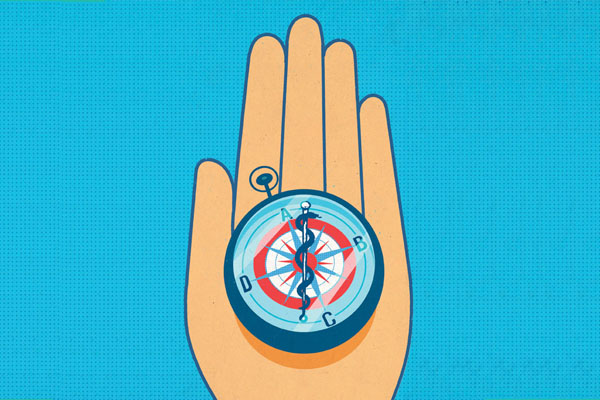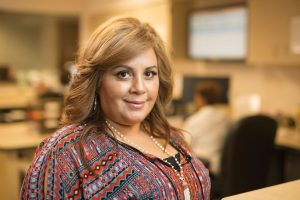A Helping Hand
Navigators guide patients through complex medical journey
December 6, 2016 | Nancy Humphrey

Illustration by Dan Page
Imagine trying to navigate an unfamiliar Medical Center with appointments sprinkled across numerous buildings, often on different days of the week. Now add a cancer diagnosis, and the emotions that come with that, and traversing unfamiliar surroundings becomes infinitely more difficult.
Your life has just been turned upside down and there’s much to do. There are appointments to coordinate and life-changing decisions to make. Life’s other challenges don’t go away either — jobs, taking care of children, grandchildren and homes.
Wouldn’t it be nice if cancer care was equipped with a GPS to help patients navigate such an emotionally charged and complicated time?
That’s exactly one of the thoughts behind Vanderbilt’s participation in the Centers for Medicare and Medicaid Services’ (CMS) new Oncology Care Model, which supports and encourages higher quality, more coordinated cancer care. One of the features of this model is an increase in patient navigators to help patients, many of whom are from out of state, through their complex medical journey.
More than 3,200 oncologists—about one-fifth of U.S. oncology specialists—are participating in the initiative that runs through June 30, 2021, involving 155,000 Medicare beneficiaries nationwide. Vanderbilt is one of only four group practices in Tennessee participating in the innovative program.
Simply put, the initiative is aimed at improving patient access and the quality of health care while spending dollars more wisely. There are three goals: better care, smarter spending and healthier people.
Practices participating in the five-year Oncology Care Model will provide treatment following nationally recognized clinical guidelines for patients undergoing chemotherapy, with an emphasis on patient-centered care. They will provide enhanced services to patients in the model to help them receive timely coordinated treatment.
There are two types of patient navigators at Vanderbilt-Ingram Cancer Center (VICC)—nurse and lay. VICC is taking the initiative one step further by adding seven new lay patient navigators to the current stable of four to help Medicare Fee for Service patients maneuver the often complicated system while on chemotherapy.
In addition to better navigation, Medicare patients will also be given assistance that is normally unfunded—financial support of transportation, help with translation and elder and child care.
“The goal of this initiative is to improve the patient experience, and navigation is a critical piece of the puzzle—but we are also looking at all needs—medical, psychological, financial. Navigators, providers, nursing teams, financial counselors, telephone operators and patient service representatives, in sum, everyone, will be important to the success of the project,” said Michael Neuss, M.D., Chief Medical Officer of VICC.
At the end of the five-year project an analysis will be performed of: the patient experience and sense of engagement; patient symptom outcomes (pain, nausea, anxiety and depression); and the cost for Medicare. As part of the initiative, Vanderbilt and the participating practices will offer seven-day-a week outpatient symptom management care to provide the most appropriate setting for patient care delivery outside the Emergency Department.
Leslie Ann Medina is a lay navigator working with Vanderbilt surgeons to provide the best care for head and neck cancer patients.
Medina, who worked backstage with artists performing at Nashville’s Ryman Auditorium prior to joining Vanderbilt five years ago, is an ideal fit for her job—her father died of laryngeal cancer in Michigan when she was a child.

Leslie Ann Medina. Photo by Daniel Dubois.
“It was very traumatic for my family. We’d never even heard of head and neck cancer, and we never had known anyone who experienced anything like that,” she said. “We were very alone in the process. We weren’t properly educated about what was happening to him and we didn’t know what choices we had. At that time doctors told you what was happening. They didn’t ask you what you wanted done. There was a lot of struggling, pain and supportive care that he went without.”
Medina said that part of her role at Vanderbilt is to see that patients aren’t isolated from decisions about their care. “We want to empower our patients, to educate them with resources and choices, about what’s going to work for them and what their quality of life is going to look like.”
Lise Ridings, administrative director for VICC, said the feeling of coming into the Cancer Center with new people, treatments, locations and unknowns is overwhelming for the majority of patients with cancer. “Our patients and their families need a partner to support them through this journey and serve as their information portal and advocate to navigate the system, finances and fear associated with a cancer diagnosis. We are excited to expand this important role of improving coordination of services across the care continuum for our patients who we care so much about.”
The lay navigators can’t write orders or make clinical decisions for patients, Ridings said, but they can improve communication and support the care delivery process with improved educational, personal and emotional support.
Medina, for example, is strategically placed with head and neck surgeons so they can communicate quickly about a patient’s next steps. Patients often need help figuring out transportation
or lodging or scheduling appointments for the same day—or on consecutive days if they are from out of town. Many just need someone to talk to.
“The most important thing is to make things happen as quickly as possible for them,” she said. “One thing we pay special attention to, on Thursdays and Fridays, is getting back with patients right away so they don’t have to go a whole weekend without hearing from someone. We want to communicate back as quickly as possible so patients don’t feel like they’re left alone. I feel that’s a big difference here at Vanderbilt that we’re committed to and our leadership is committed to. The Cancer Center has the resources to make that happen.”
Putting a name with a face is also important. After the initial screening phone call, most patients are seen at Vanderbilt quickly after a cancer diagnosis. “When they get here for their appointment, we go out to meet them so they can put a name with a face and give them a walking map and directions to other appointments they might have like medical oncology or radiation oncology,” Medina said. “Sometimes we’ll walk them to their next appointment or arrange for transportation if they need it. It’s important to give them their itinerary in person, learn who their support person is, and hear about issues that they didn’t relate on the phone. Meeting them in person is very important.”
Medina recalls a patient with oral cancer from West Tennessee who called earlier this year with many questions about the care she would receive at Vanderbilt. “We stayed on the phone for about 40 minutes. She wanted to know what was going to happen to her and how we would go about communicating with her as a team. She was very afraid of getting lost in a machine, and I told her to follow what her heart was telling her to do, that she needed to be comfortable with her decision. I assured her that we are very relationship-based.”
The patient ended up going to another large cancer center for her care, but Medina’s help made an impression. “She was getting ready for a procedure at the other cancer center, and her husband called me and said ‘we don’t like it here. It’s cold. It’s massive. How soon could we get her into Vanderbilt if we left right now?’ I had everything charted from our conversation, and brought her information up on my computer.”
The woman ended up coming to Vanderbilt for her care. “You spend a lot of time on the phone with the patient and their family and they become comfortable with you,” she said. “They know who I am, and they know they can get back to me whenever they need. All they have to do is call the main number, have me paged and I’ll call them right back. It makes a difference.”
Medina remembers one patient who was coming to VICC from Washington State. “He was all alone. He called and said ‘I’ve been doing research and reading about your cancer center.’ He said he was considering moving to the region so he could get his care here, and he did. He found a job, moved to southern Kentucky, had his surgery and radiation here and is doing very well.”
Medina loves her job, but admits it can be emotionally draining. “I take my time with our patients. I may get my slinky out of my drawer and play with it, or look at flowers in my office window, just to remind me of something pretty, alive and growing. It’s tough to see our patients scared, and I know that many will have trouble remembering all they’re being told.”
As part of the initiative, Vanderbilt and the participating practices will offer seven-day-a-week outpatient symptom management care.
